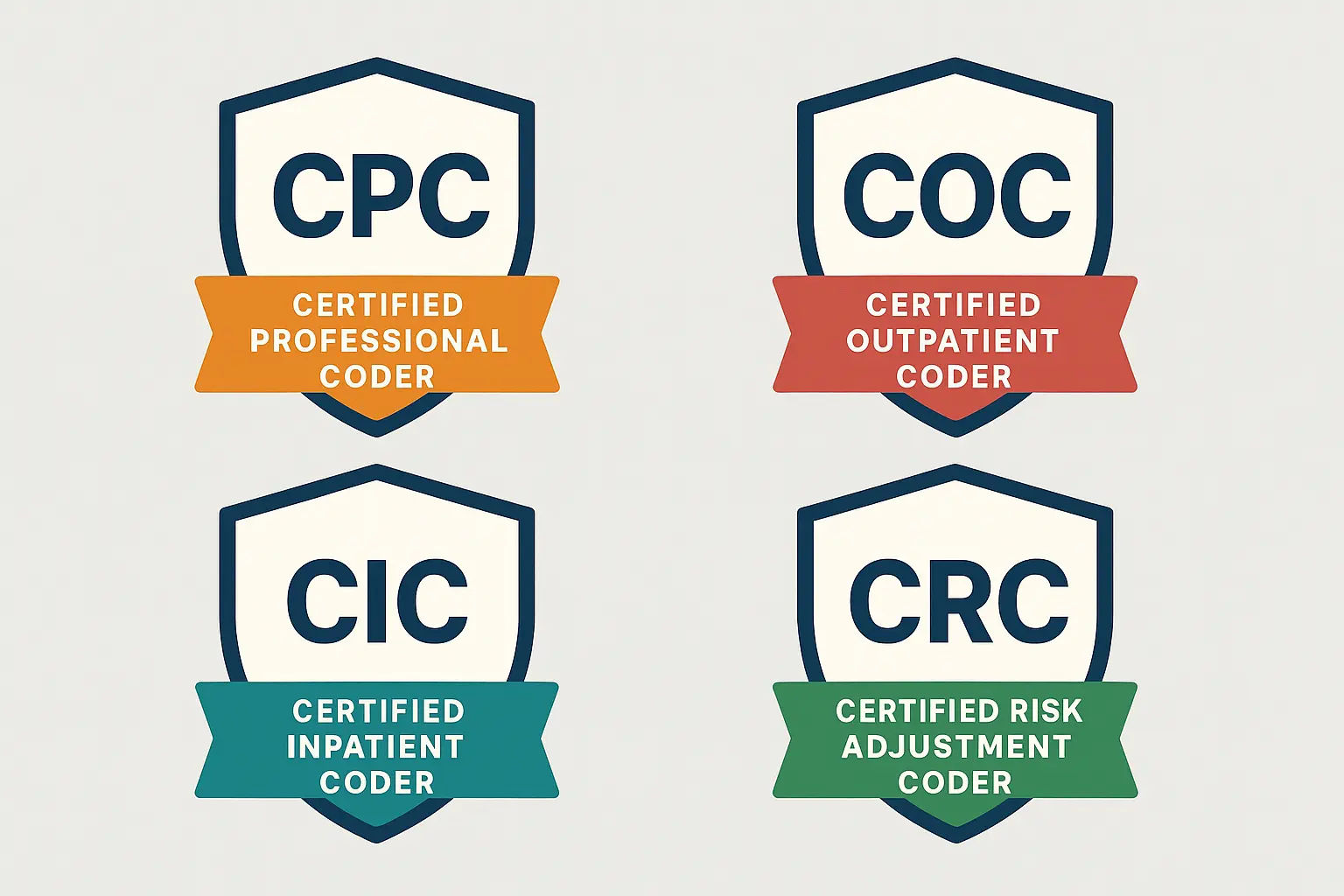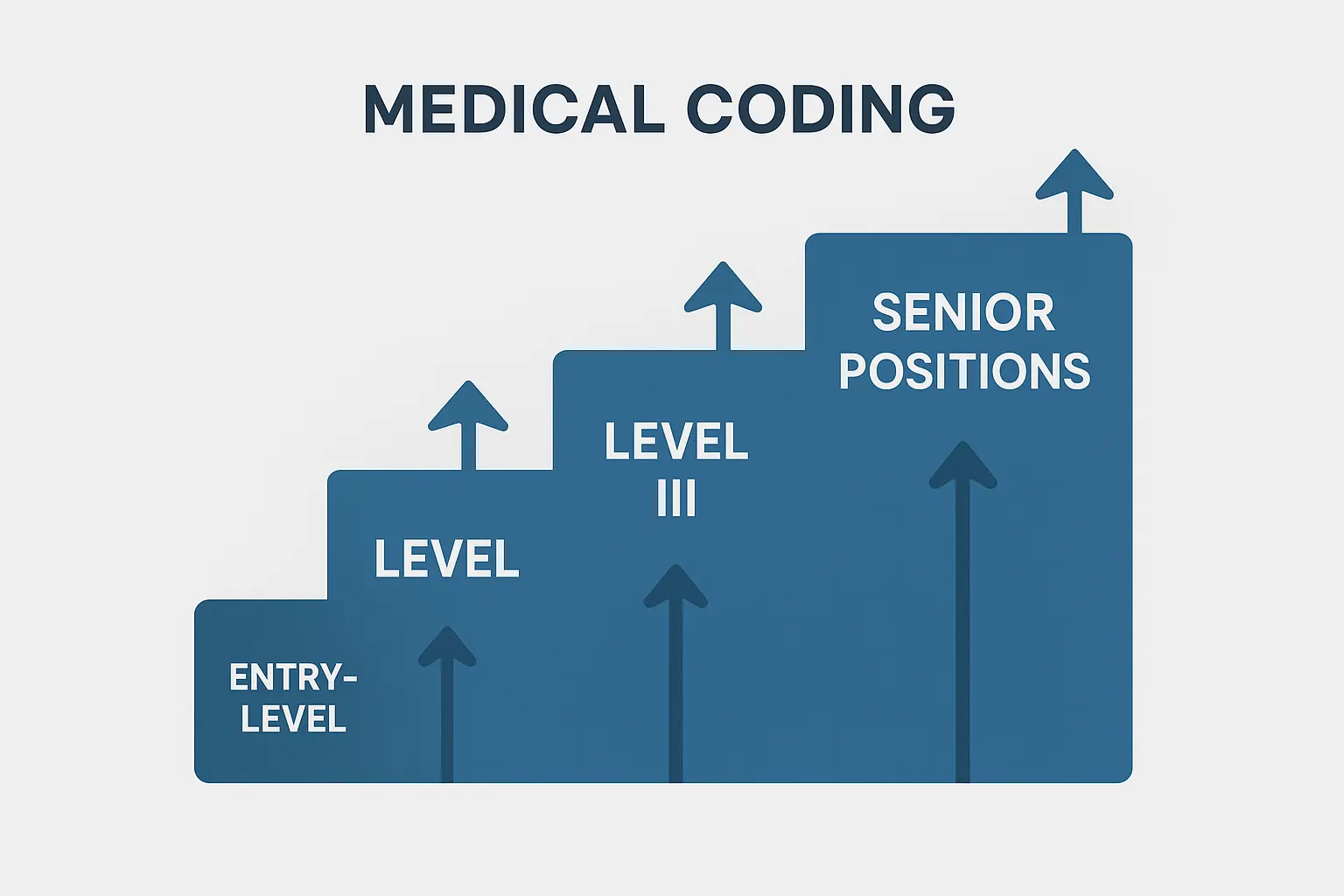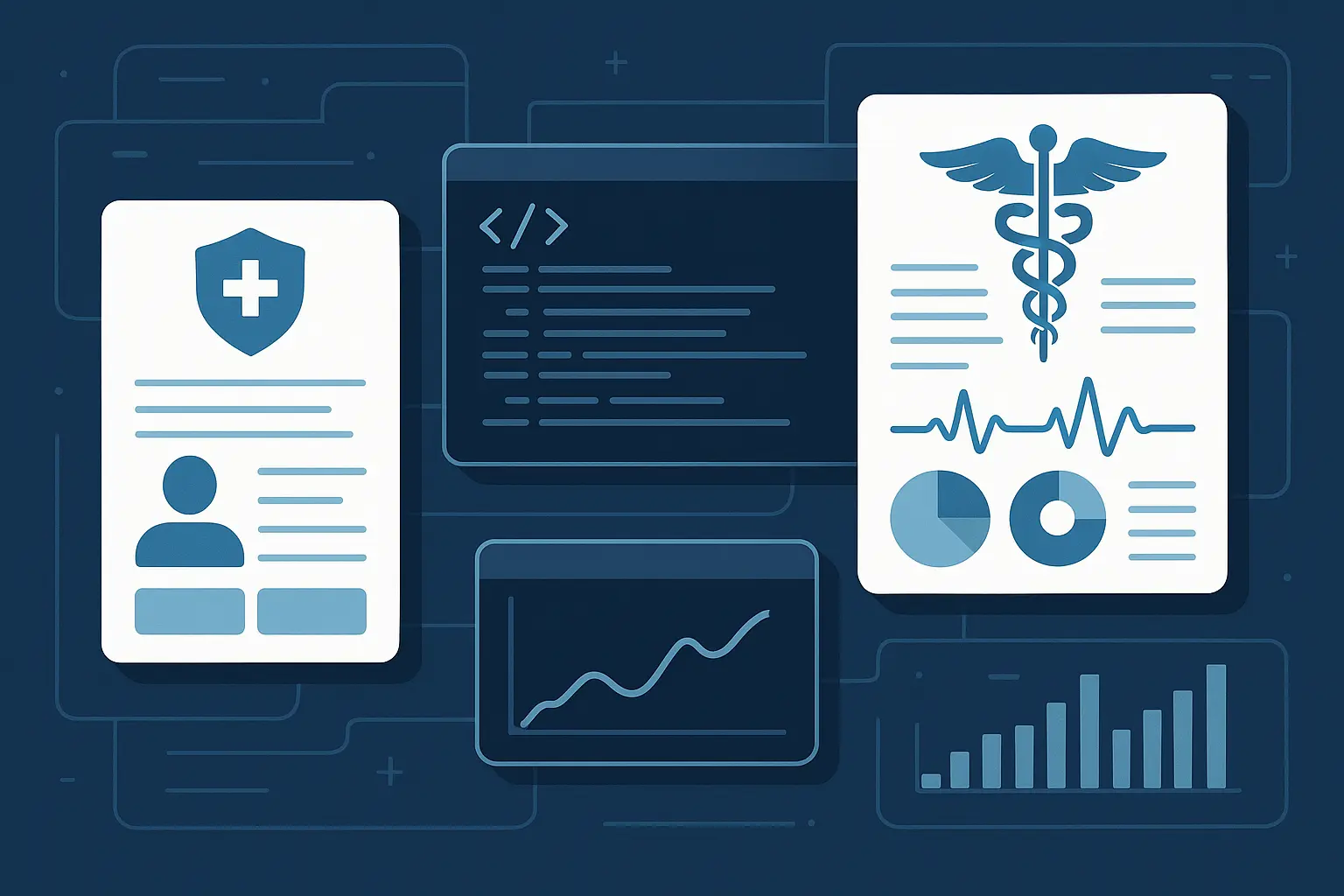Table of Contents
-
Understanding What Certified Outpatient Coders Actually Earn
-
Where You Live Makes a Huge Difference in Your Paycheck
-
Why Your Certifications Are Worth More Than You Think
-
The Real Path to Making More Money in This Field
-
Smart Moves That’ll Boost Your Earning Power
-
What the Future Holds for Our Salaries
-
How ValidGrad Can Support Your Career Journey
-
Final Thoughts
TL;DR
-
Entry-level certified outpatient coders start around $35,000-$42,000, but experienced pros can earn $50,000-$65,000+ annually
-
Location changes everything – cities like San Francisco and New York pay 20-40% above national averages
-
The COC certification alone can boost your earnings by $8,000-$12,000 compared to non-certified positions
-
Specialty certifications and audit roles offer the fastest path to salary increases of 15-25%
-
Remote work opportunities are exploding, giving you access to higher-paying positions anywhere
-
The field’s projected to grow 3-5% annually through 2030, with median salaries potentially hitting $60,000+
Understanding What Certified Outpatient Coders Actually Earn
Here’s the truth nobody tells you upfront: your paycheck as a certified outpatient coder depends on three big things – how long you’ve been doing this, where you live, and what you specialize in. The starting salary might make you wince, but stick with me – this field has serious earning potential if you play your cards right.
Starting out, I learned that salary expectations need to be grounded in reality. We work in a specialized niche that’s growing fast, but your paycheck depends on several key factors. According to recent data from the Bureau of Labor Statistics, the median salary for medical records and health information specialists hit $50,250 per year in their latest May 2024 report.
The salary landscape has changed dramatically over the past few years. What I find encouraging is how our profession has gained recognition for its complexity and importance in healthcare operations. This recognition translates directly into better paychecks for qualified professionals.
The Starting Line: What New Coders Can Expect
Fresh out of training, you’re looking at somewhere between $35,000 and $42,000 per year. I know that doesn’t sound like a fortune, but here’s what I’ve noticed – the learning curve is steep, and employers will pay more once you prove you can handle the workload without constant supervision.
Most entry-level positions come with training periods where you’ll work alongside experienced coders. This mentorship phase is invaluable (even if it doesn’t immediately show up in your paycheck). According to Nurse.org, medical coders with less than 1 year of experience earn an average of $19.33 per hour, which translates to roughly $40,206 annually for full-time work.
Sarah’s Entry-Level Journey: Sarah completed her COC certification through an online program and started at a multi-specialty clinic earning $38,000. Within her first year, she demonstrated proficiency in outpatient surgical coding and received a $3,500 raise. By focusing on accuracy and asking thoughtful questions during her training period, she positioned herself for rapid advancement.
The entry-level salary reflects the investment employers make in training new professionals. They understand you’re still developing speed and accuracy, which is why patience during this phase pays off big time.
Mid-Career: Where the Real Money Starts
Once you’ve got 3-7 years under your belt, things get interesting. You’re looking at $45,000 to $58,000, and honestly, this is where I’ve seen people really hit their stride.
You’re no longer the newbie asking questions every five minutes. Instead, you might find yourself training others or tackling more complex cases. Some coders I know have moved into specialized areas during this phase, which can bump up their earnings even more.
This stage represents the sweet spot where your growing expertise gets recognized. Employers see your value and are more willing to invest in your continued development.
Senior Level: The Sweet Spot for Experienced Professionals
Senior coders – we’re talking about folks with serious experience and often supervisory responsibilities – can pull in $60,000 to $75,000 or more. At this level, you’re solving problems, making decisions, and probably managing people too.
What’s fascinating is how much your expertise becomes valued. You become the person others turn to when they encounter something tricky, and that expertise translates directly into higher compensation.
Where You Live Makes a Huge Difference in Your Paycheck
I can’t stress this enough – where you work matters tremendously for your certified outpatient coder salary. The numbers on your paycheck tell only part of the story, though. You’ve got to factor in what it actually costs to live there.
Big City, Big Paychecks (But Also Big Expenses)
Cities like San Francisco, New York, and Boston? They’re paying 20-40% above what you’d see nationally. Sounds great until you realize your rent might eat up most of that premium.
Here’s the thing – if you can make it work financially, these markets often have more opportunities for advancement and specialization. The healthcare systems are typically larger and more complex, which means more chances to develop valuable skills.
The salary in major metropolitan areas reflects the competitive nature of these markets. Employers understand they need to offer premium compensation to attract and retain qualified professionals.
Regional Salary Comparison for Medical Coders
|
Region |
Average Annual Salary |
Cost of Living Index |
Adjusted Value |
|---|---|---|---|
|
Pacific |
$62,685 |
115.2 |
$54,408 |
|
Mid Atlantic |
$58,834 |
108.7 |
$54,128 |
|
New England |
$58,334 |
109.3 |
$53,379 |
|
Mountain |
$55,086 |
102.1 |
$53,943 |
|
West South Central |
$54,958 |
95.8 |
$57,373 |
|
West North Central |
$54,084 |
98.2 |
$55,078 |
|
South Atlantic |
$53,784 |
99.4 |
$54,108 |
|
East North Central |
$53,644 |
97.5 |
$55,017 |
|
East South Central |
$51,902 |
92.3 |
$56,243 |
Source: Becker’s ASC Review
Small Towns: Lower Numbers, Better Life?
Rural areas might pay less on paper, but your dollar goes further. Plus, I’ve noticed more rural employers offering remote work arrangements, which can be a total game-changer.
You might earn $40,000 in a small town where that same lifestyle would cost you $65,000 in a major city. The math starts looking pretty attractive when you break it down that way.
Recent industry analysis shows that “Medical billers and coders can earn a decent salary for an entry-level position and have the option to work from home” according to Nurse.org. This shift has fundamentally changed how we think about earning potential across different geographic markets.
Why Your Certifications Are Worth More Than You Think
Let me be blunt about certifications – they’re not just fancy letters after your name. Professional certifications significantly boost your earning potential, and the COC credential alone can add serious money to your annual paycheck.
I’ve seen the difference firsthand, and it’s substantial. The salary gap between certified and non-certified professionals continues to widen as employers recognize the value of validated expertise.
The COC: Your Golden Ticket
The COC certification from AAPC is basically your golden ticket in this field. We’re talking about an $8,000 to $12,000 annual bump compared to non-certified positions. That’s serious money.
Employers see that certification and know you’ve met industry standards. It removes a lot of uncertainty from their hiring decision, which translates into better offers for you. Data from Becker’s ASC Review shows that Certified Outpatient Coders earn an average of $65,028 annually, significantly higher than other coding credentials.
Professional achievements deserve proper recognition, and knowing how to display your certifications professionally can enhance your credibility in interviews and workplace settings. The salary premium you earn from certification makes the investment in proper presentation worthwhile.
Specialty Certifications: The Extra Mile That Pays
Specialty certifications like the CCS-P or area-specific credentials can tack on another $3,000 to $8,000 to your annual salary. The key is choosing specialties that are in demand in your area.
I’ve seen coders focus on surgical coding or specific medical specialties and watch their career opportunities expand dramatically. You become the go-to person for complex cases, and that expertise commands premium compensation.
Certification Impact on Annual Salary
|
Certification |
Average Annual Salary |
Premium vs. Non-Certified |
|---|---|---|
|
Certified Professional Compliance Officer |
$77,333 |
+$16,311 |
|
Certified Professional Coder-Instructor |
$75,403 |
+$14,381 |
|
Certified Professional Practice Manager |
$71,004 |
+$9,982 |
|
Certified Documentation Expert-Outpatient |
$69,987 |
+$8,965 |
|
Certified Professional Medical Auditor |
$69,172 |
+$8,150 |
|
Certified Outpatient Coder |
$65,028 |
+$4,006 |
|
Certified Risk Adjustment Coder |
$64,882 |
+$3,860 |
|
Certified Inpatient Coder |
$63,191 |
+$2,169 |
|
Certified Professional Coder-Payer |
$62,612 |
+$1,590 |
|
Certified Professional Coder |
$57,201 |
Base Level |
Source: Becker’s ASC Review
Continuing Education: Small Investment, Big Returns
Keeping up with continuing education requirements isn’t just about maintaining your certification – it’s about staying competitive. I’ve noticed that coders who actively pursue additional training tend to see 3-5% salary increases annually.
It shows employers you’re serious about your profession and willing to invest in staying current with industry changes. According to AAPC data, certified coders earn 8.5% more than non-certified coders, while those with three AAPC certifications earn an average of $84,414 per year compared to $61,022 for non-certified professionals.
This commitment to ongoing learning directly impacts your salary trajectory throughout your career.
The Real Path to Making More Money in This Field
Moving up in this field isn’t about time served – it’s about strategic career moves and skill development. I’ve watched colleagues take different paths, and some approaches definitely work better than others.
Technical Specialization: Becoming the Expert
Audit and compliance roles are where I’ve seen some of the biggest salary jumps. We’re talking 15-25% increases when you move into these specialized positions.
Clinical Documentation Improvement (CDI) specialists are particularly well-compensated, often earning $55,000 to $70,000. The role requires you to bridge clinical knowledge with coding expertise, which creates significant value for healthcare organizations.
Mike’s Specialization Success: Mike started as a general outpatient coder earning $42,000. After two years, he pursued additional training in surgical coding and compliance auditing. Within 18 months, he transitioned to a coding auditor role earning $58,000 – a 38% salary increase. His specialized expertise in identifying coding discrepancies and ensuring compliance made him invaluable to his organization.
The salary premium for specialized roles reflects the additional expertise and responsibility these positions require.
Management Track: Leading Teams and Budgets
Team lead positions typically come with $5,000 to $10,000 salary bumps, plus you get experience managing people and processes. It’s good preparation for bigger management roles.
Coding managers can earn $65,000 to $85,000 annually, but you’re taking on budget responsibilities, staff development, and strategic planning. The skill set is different from coding, but the financial rewards reflect that expanded responsibility.
Remote and Freelance: New Opportunities in a Digital World
Remote work has completely changed the game. You can now work for employers anywhere in the country, which means access to higher-paying markets without relocating.
Freelance work can be particularly lucrative for experienced coders. I know freelancers earning $25 to $40 per hour, with some specialized consultants commanding even higher rates. The key is building a solid reputation and client base.
The earning potential in remote and freelance arrangements often exceeds traditional employment, especially for experienced professionals with specialized skills.
Smart Moves That’ll Boost Your Earning Power
Maximizing your earning potential isn’t about luck – it’s about making smart, strategic decisions throughout your career. Here’s what I’ve learned actually works.
Building Your Foundation Right
Your educational foundation matters more than you might think. AHIMA or AAPC-approved programs aren’t just about getting certified – they’re about building relationships with employers and getting quality training.
Here’s what I recommend:
-
Research programs with strong job placement rates
-
Look for curriculum that focuses heavily on outpatient coding
-
Consider the format that works best for your learning style
-
Don’t rush the certification timeline – preparation matters
Career Preparation Checklist:
-
☐ Research AHIMA and AAPC approved programs in your area
-
☐ Compare program costs against potential salary increases
-
☐ Identify local healthcare employers and their preferred certifications
-
☐ Set up informational interviews with working coders
-
☐ Create a realistic timeline for certification completion
-
☐ Budget for exam fees, study materials, and continuing education
-
☐ Join professional organizations early for networking opportunities
If you need to replace lost educational documents during your career journey, understanding the diploma replacement process can save you time and ensure you’re always prepared for opportunities. This preparation directly supports your salary negotiations by ensuring you have proper documentation.
Professional Development That Actually Pays Off
Professional development isn’t about checking boxes – it’s about strategic skill building that employers value.
Focus on these areas:
-
Identify which specialties are in high demand locally
-
Join professional organizations (AHIMA, AAPC) and actually participate
-
Attend conferences and local chapter meetings
-
Find a mentor who’s where you want to be in 5-10 years
The networking aspect is huge. Some of the best opportunities I’ve seen came through professional connections, not job boards.
Jennifer’s Networking Success: Jennifer attended her local AAPC chapter meetings consistently for two years while working as an entry-level coder. Through connections made at these meetings, she learned about a specialized orthopedic coding position that wasn’t publicly posted. Her networking efforts led to a $12,000 salary increase and specialized training opportunities that further boosted her career trajectory.
Job Search and Negotiation Strategies That Work
Salary negotiation in this field is often more flexible than people realize, especially if you’ve done your homework.
Before any job interview:
-
Research salary ranges using multiple sources (Glassdoor, PayScale, BLS data)
-
Document your certifications, achievements, and any specialized experience
-
Network with local professionals to understand what’s really happening in your market
-
Prepare specific examples of how your skills add value
Don’t just accept the first offer. Most employers expect some negotiation , and they often have room to move on salary or benefits. Your certified outpatient coder salary depends heavily on your preparation and willingness to advocate for yourself.
Salary Negotiation Preparation Template:
-
Market Research: Current salary ranges for your position and location
-
Personal Value Proposition: List of certifications, specializations, and achievements
-
Quantifiable Accomplishments: Accuracy rates, productivity metrics, process improvements
-
Negotiation Points: Salary, benefits, professional development budget, flexible work arrangements
-
Backup Plan: Minimum acceptable offer and alternative opportunities
What the Future Holds for Our Salaries
The future looks pretty bright for our field, and I’m genuinely optimistic about where salaries are heading. Several trends are working in our favor.
Industry Growth is Real and Sustainable
Healthcare keeps expanding, and outpatient services are growing even faster than the overall sector. An aging population means more medical procedures, and the shift toward outpatient care (because it’s more cost-effective) creates more opportunities for us.
Regulatory requirements aren’t getting simpler either. If anything, compliance demands are increasing, which means employers need skilled coders who can navigate complex requirements accurately.
Industry reports indicate that “The healthcare industry is constantly evolving, with new regulations and coding standards emerging regularly” according to Vocal Media, emphasizing the ongoing need for certified professionals who can adapt to these changes. This evolution directly supports higher salaries as the complexity of our work increases.
Salary Projections Look Promising
Short-term projections through 2026 show entry-level salaries reaching $38,000 to $45,000, with experienced professionals earning $55,000 to $70,000 in most markets.
By 2030, we might see median salaries exceeding $60,000 nationally. Specialized roles could command $75,000 to $90,000 or more. These aren’t pie-in-the-sky numbers – they’re based on current growth trends and demand projections.
The salary trajectory reflects the increasing recognition of our profession’s importance in healthcare operations and revenue cycle management.
Emerging Specialties Offer Premium Pay
Telehealth coding, value-based care documentation, and AI-assisted coding oversight are emerging as high-paying specialties. Early adopters in these areas are seeing 20-30% salary premiums.
The key is staying ahead of these trends rather than waiting for them to become mainstream. By then, the premium opportunities might be saturated.
Geographic Hotspots: Where the Action Is
Sun Belt states like Texas, Florida, Arizona, and North Carolina are experiencing rapid healthcare expansion. I’ve been watching job postings in these areas, and the opportunities are impressive.
Remote work has changed the game completely. You can now live in a lower cost-of-living area while working for employers in expensive markets. It’s geographic arbitrage at its finest.
Consider these moves:
-
Monitor remote job boards for out-of-state opportunities
-
Develop strong communication and technology skills for remote success
-
Build relationships with healthcare recruiters who specialize in remote positions
-
Research high-growth markets if you’re open to relocating
For professionals considering career transitions or relocations, understanding additional business certifications can complement your coding credentials and open doors to management opportunities.
How ValidGrad Can Support Your Career Journey
Throughout your career, you’ll encounter situations where having backup documentation of your educational achievements becomes important. Maybe you’ve lost your original diploma during a move, need a replacement for display in your home office, or want to keep your original safe while having a copy for professional portfolios.
ValidGrad’s diploma maker service helps medical coding professionals create high-quality replicas of their educational credentials for legitimate backup and display purposes. This becomes particularly valuable when you’re:
-
Setting up a professional workspace that showcases your qualifications
-
Creating backup documentation while securing originals
-
Building comprehensive professional portfolios for career advancement
-
Replacing damaged certificates that hold personal significance
As you advance in your career, having proper documentation readily available ensures you’re always prepared for opportunities that arise. ValidGrad’s user-friendly platform makes it simple to create professional-quality replacement documents that serve as meaningful reminders of your educational journey and professional dedication to the medical coding field.
When building your professional portfolio, knowing how to properly display your diplomas can enhance your office presentation and demonstrate your commitment to professional excellence. This attention to detail supports your efforts to maximize your earning potential by presenting yourself as a serious professional.
Ready to take the next step in your career? Visit ValidGrad today to ensure your educational achievements are properly documented and protected as you advance in the certified outpatient coder profession. Your salary potential increases when you present yourself professionally at every opportunity.
Final Thoughts
The certified outpatient coder salary landscape offers genuine opportunities for financial growth and career satisfaction. Starting salaries might seem modest, but the potential for advancement is real and achievable with the right strategy.
What I’ve learned throughout this journey is that success in this field isn’t just about coding accurately – it’s about positioning yourself strategically, investing in the right certifications, and staying ahead of industry trends. The coders who earn the most aren’t necessarily the ones who’ve been around the longest; they’re the ones who’ve made smart career moves and continued developing their skills.
Geographic flexibility, whether through remote work or strategic relocation, can dramatically impact your earning potential. The healthcare industry’s continued expansion, particularly in outpatient services, creates a favorable environment for salary growth that should continue well into the next decade.
Your certification is your foundation, but specialization is where the real money lies. Whether you choose the technical route through audit and compliance roles or the management track, the key is making intentional decisions about your career path rather than just letting things happen.
For those considering the educational investment required for this career, exploring the true cost of educational credentials can help you make informed financial decisions about your professional development.
The future looks bright for certified outpatient coders who are willing to adapt, learn, and position themselves strategically in this evolving field.








